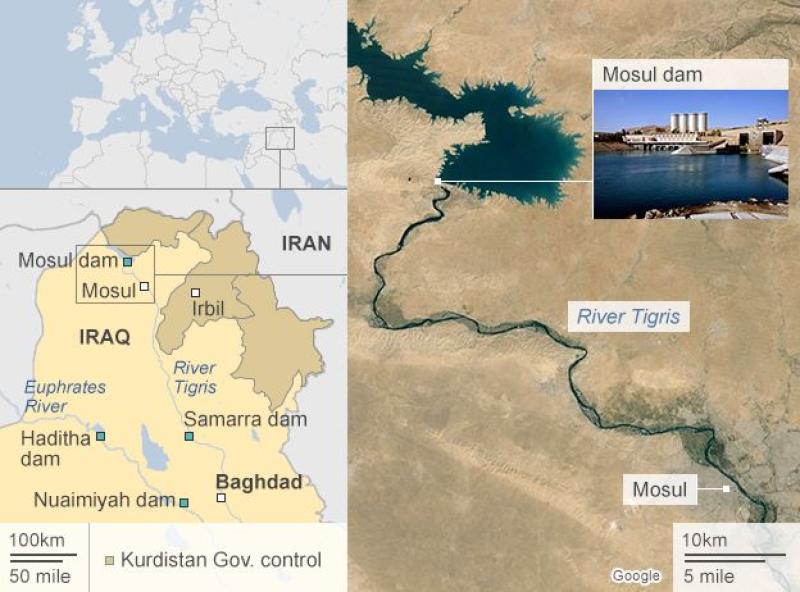Mosul Dam in Danger of Inundating Northern Iraq

The US Embassy in Baghdad issues a statement [1], including a fact sheet of the major concerns. Residents in the threatened areas are encouraged to move a minimum of 6 kilometers away from their current residences. The Baghdad Airport is within the flood plain, as well.

Tigris/Mosul Dam Image, from BBC, Feb. 29, 2016 article "US warns of Mosul dam collapse in northern Iraq".
While the U.S. Embassy is now publicizing the situation, experts from the region have been aware of the precarious nature of these cross-border water management systems for quite some time. Groups of academics and civil engineers in the governments of the riparian states have been working together, ascending politics to address issues pragmatically. They have been working without fanfare to avoid the political eruptions that cross-border water issues can cause.
According to Aysegul Kibaroglu, Professor of Political Science and International Relations at MEF University in Istanbul*, under the leadership of the ETIC (https://euphratestigrisinitiativeforcooperation.wordpress.com/) the issue of dam safety was identified in 2006 by a group of scientists and government representatives from Iraq, Turkey, Syria and Iran. According to Kibaroglu, "Decaying dams in Iraq and Syria have been an urgent matter for some time". She cited the example of the collapse of the Zeyzoun Dam in Syria in 2002, which impacted villages in the area of the Orontes river basin [2].
The current situation in Mosul threatens the lives of between 500,000 and 1.47 million Iraqis living in the regions of Tigris river basin and surrounding wadis [3]. This situation is not only a hazard, but presents the possibility of the Islamic State utilizing dams as a weapon. Kibaroglu on the implications for the war against the so-called Islamic State:
"There is no doubt that the Islamic State has a very clear strategy for controlling key water resources infrastructure and using them as weapons against the populations and governments it seeks to coerce or to destroy. It is time that nearby states and the international community re-examine what they know about the Islamic State's tactics and formulate a new plan of action. Forces fighting the Islamic State must look at the region as a single integrated basin and bring bodies of water — and by extension, the populations dependent on them — to the forefront of their strategies."
Cited Sources:
- http://iraq.usembassy.gov/022816.html?utm_source=Sailthru&utm_medium=email&utm_campaign=New%20Campaign&utm_term=%2ASituation%20Report
- http://news.bbc.co.uk/2/hi/middle_east/2025583.stm
- http://www.bbc.com/news/world-middle-east-35690616
*Professor Kibaroglu is currently a visiting professor at the University of Texas, Austin, and will deliver a public lecture on the Euphrates Tigris Region and its Water Resource Issues, on April 21st, at the Ohio State University.
